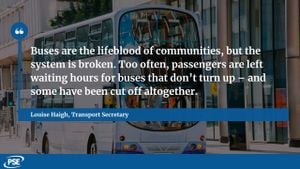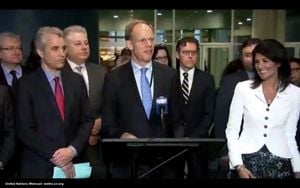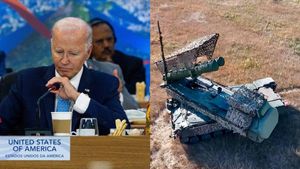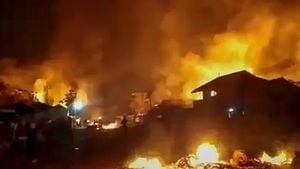Ghana is at a crossroads, grappling with severe economic challenges and political commentary from influential figures. With soaring inflation, high unemployment rates, and heavy national debt, the Ghanaian populace is feeling the weight of these issues more than ever. Amidst this bleak backdrop, significant voices have emerged, expressing their concerns and urging for accountability from the government.
Recently, the influential Togbe Afede XIV, the Agbogbomefia of the Volta Region, voiced serious concerns about the state of the economy during the 2024 Te Za Grand Durbar. He highlighted the troubling rise in the cost of living and the staggering national debt. "Our country is heavily indebted. The sad part is we have accumulated so much debt, yet we lack so much," he lamented. The Agbogbomefia underscored the palpable frustration among citizens, particularly the youth who have struggled with prolonged unemployment and increasing poverty.
Togbe Afede does not hold back his critiques. "Inflation has eaten so deeply... our cedi knows only one direction, and that's depreciation," he remarked, pointing to the drastic fall of the Ghanaian currency, which has gone from four cedis to over sixteen to the dollar within the last eight years. The impact of such depreciation cannot be overstated, as it has directly contributed to skyrocketing prices across all sectors.
More alarming, the Agbogbomefia pointed out the increase in suicide rates among Ghanaians, linking this tragic trend to the economic hardships faced daily. Reports indicated 81 successful suicides out of 543 attempts just within the first half of the year. This statistic sheds light on the growing desperation felt by many, underlining the urgent need for intervention.
Beyond economic grievances, Togbe Afede criticized the prevalence of corruption and scandals within the government. He called attention to high-profile issues such as the Power Distribution Services (PDS) scandal and mismanagement surrounding the National Cathedral project, underscoring how such events erode public trust. "Our country is full of scandals. It is incredible... almost every day, there is something new," he stated.
Franklin Cudjoe, president of the policy think tank IMANI Africa, also weighed in on the political climate, particularly targeting former President John Kufuor's recent endorsement of Dr. Mahamudu Bawumia for the upcoming presidential elections. Cudjoe questioned Kufuor's silence on the economic turmoil faced by everyday Ghanaians, stressing the plight of senior citizens who have suffered severe financial losses due to the government's policies. "Did he sympathize with us? Where has he been when we’ve had to deal with 54% inflation?" he challenged, implying the former president's disconnect from the current struggles of the nation.
Kufuor, reflecting on his support for Bawumia, urged the populace to have faith, claiming improvements are on the horizon if Bawumia is elected. But Cudjoe retorted with skepticism, questioning how someone could support Bawumia, who is seen as partly responsible for the economic mismanagement leading to Ghana's current state. He insisted it is unacceptable for former leaders to overlook the dire conditions plaguing their fellow citizens.
"Where was Kufuor when defenseless and frail old men and women had to queue under the scorching sun to beg Nana and Bawumia's government to hand over their savings?" Cudjoe asked, drawing attention to the heart-wrenching decisions many have been forced to make due to insecurity about their finances.
According to the World Bank's projections, poverty rates could rise to as much as 31.5% by 2026, with limited growth anticipated and products rising faster than incomes. Such numbers paint a grim picture of the economic reality, highlighting why public sentiment has turned sour against the ruling government.
On the debt restructuring front, the ratings agency Fitch recently announced it expects to move Ghana out of sovereign default by July 2025. This forecast stems from anticipated completion of foreign debt restructuring by mid-year. It's optimistic the nation can finalize the necessary adjustments to different forms of debt by year-end. The news, presented during a webinar with discussions on similar matters facing neighboring countries such as Zambia and Ethiopia, presents both hope and skepticism.
Despite this positive outlook, recent statistics highlight the severity of Ghana's economic malaise. By reworking around US$14.2 billion of Eurobonds, Ghana aims to alleviate the burdens of its debt-to-GDP ratio, which had calculated to over 763 billion cedis as of 2024. Yet, moderate growth of 2.5% is projected for the current year, which experts agree is inadequate to recover more substantial losses suffered under current leadership.
Interest payments outlined by Fitch suggest significant reductions to revenues—8% for 2024, descending to 4% by 2026. This breathes some hope but also demonstrates the uphill battle Ghana faces to stabilize its economy.
Compounding these fiscal strategies is the cultural and social fabric of Ghana. The youth's frustrations are boiling over as they contemplate their futures amid stagnant job growth and soaring inflation rates. Togbe Afede voiced his discontent with the government’s handling of unemployment, pointing out frustrations leading young people to seek opportunities abroad or become embroiled in social unrest.
The prospect of the 2024 elections adds another layer of complexity as Ghanaians face urgent choices impacting their economic lifecycle. With the New Patriotic Party (NPP) and the National Democratic Congress (NDC) both grappling for public confidence, sentiments are laced with doubt about which party can effectively lead Ghana forward. The psychological weight of economic strife and political scandal poses real questions about the integrity of Ghana’s leadership.
It seems many Ghanaian voters are clamoring not just for change—but for impactful change, seeking accountability and transparency from their leaders. With concerns echoing through the streets and social networks, the demand for responsivity is louder than ever.
The economic forecast coupled with political unrest underlines the fragile state of Ghana's democracy and governance. Only through vigilance, integrity, and bold action can the nation's path be shifted. Ghana stands at this pivotal crossroads, and the decisions made will undoubtedly shape the nation for years to come.



